Module6 Unit1
外研版英语六年级上册Module 6 Unit 1 -课件
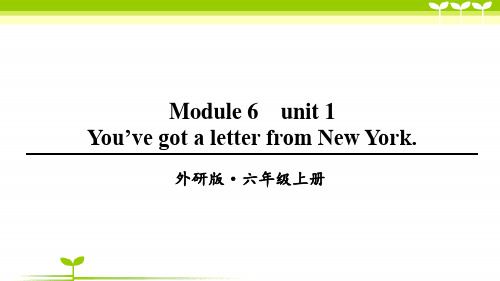
3. It’s difficult for me. 它对我来说是困难的。 difficult是形容词,意思是“困难的”。 主要指不容 易理解、不容易做或不好处理的事情。“某事+be difficult for+某人.”意思是“某事对某人来说是困难 的”。 【例句】 Singing is difficult for me. 唱歌对我来说是困难的。
2.I’ve got a book about the world. 我有一本关于世界的书。 “主语+have/has got+其他.”,这是用来表达“某人
有某物”。 【例句】 I have got a pet dog. 我有一只宠物狗。
have 的常见句型:
2 Listen and read.
Dear Sam and Amy, I am Daming’s friend and I want to be your friend too. I live in New York, but I am not American. I am from London in the UK. So we are all British! Do you like China? I want to visit China next year. Daming has got a Chinese dragon kite and we often fly it in the park. It’s difficult for me. Have you got a book about the US? I can send you one. Please write to me and we can be pen friends. Daming says he will write to you soon. Best, Luara
module_6__unit_1_were_you_at_home_yesterday

Very well, thank you. And how are you?
小同学们要注意噢:
在问候别人的时候,我们可以说: How are you? 别人问候你还好吗? 你可以回答:I’m well. 或者:I’m fine. Thank表示谢谢,但是我们在说谢谢你时 要用:Thanks . 或者:Thank you.
Chinese lesson
have a PE lesson
English lesson
Are you at home now?
Yes, I am. Ha ha …
Were you at home yesterday?
Yes, I was .
Were you in the cinema yesterday?
Match.
I
she
was
you
it
were
he we
they
Choose.
1. We (was/were) out yesterday. 2. It (is/was) windy now. And we (are/were) playing (in/under) the sun. 3.Lingling (was/is )at home yesterday. 4. They (was/were) at the park yesterday. They (is/ are) at home now. 5.Hello , (I am/ This is ) Sam speaking.
Choose .
Choose .
4.I want football the sun. A. play; on B. to play, in 5. --Hello , Daming. Xiaoyong. -- Hello, Xiaoyong. A. This is B. I am
外研版初中八年级下册英语精品词汇微课 Module 6 Unit 1
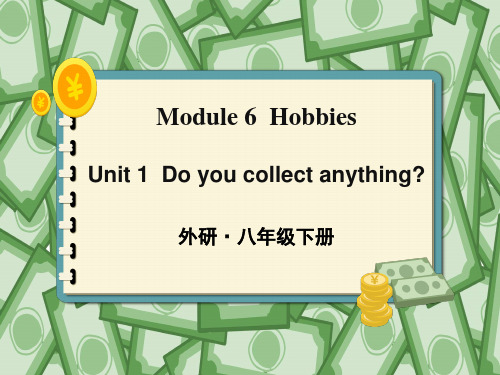
例句: ◆ I’ve collected stamps from
all over the world.
n. 邮票
讲解:
tidy up“动词+副词”型短语,名词作其 宾语时,放在up前后均可;代词作其宾 语时,必须放在tidy和up之间。
例句:
◆ We need to tidy up our room (=tidy our room up) every day.
讲解: value作不可数名词,意为“价值; 有用性”。其形容词为valuable, be of value = be valuable,意为 “是有价值的”。
n. 价值;有用性
例句:
◆ He deeply knows the value of health.
拓展:
value还可作动词,意为“重视; 珍视”。
Module 6 Hobbies
Unit 1 Do you collect anything?
外研·八年级下册
n. 扇子
讲解: fan可数名词,意为“扇子”。
例句: ◆ There were usually beautiful
pictures on the fans.
拓展: fan作名词,还可意为“迷;狂热爱好 者”,也就是人们常说的“粉丝”。
valuable,由“名词value(去 e)+后缀-able”构成,意为 “值钱的;有价值的”。
adj. 值钱的; 有价值的
例句: ◆ They must be really valuable.
prep. 用……
讲解: with介词,意为“用……”,常指用 某种具体的工具或身体某个部位。
例句: ◆ He can only write with his left hand. 拓展:with的其他含义如下 (1)意为“和……在一起;和;同;跟”。 I enjoy having breakfast with my family. (2)意为“有;具有;带有”。 The pretty girl with long hair is my younger sister.
2023年外研版英语六年级上册Module 6 Unit 1 You`ve got a letter
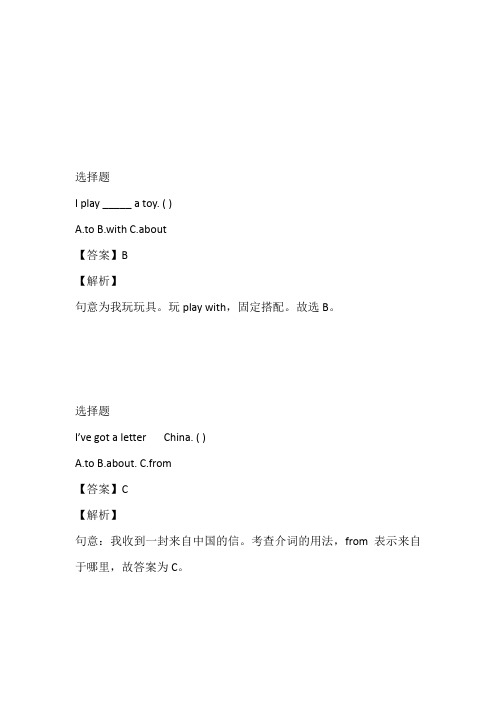
选择题I play _____ a toy. ( )A.toB.withC.about【答案】B【解析】句意为我玩玩具。
玩play with,固定搭配。
故选B。
选择题I’ve got a letter China. ( )A.toB.about.C.from【答案】C【解析】句意:我收到一封来自中国的信。
考查介词的用法,from 表示来自于哪里,故答案为C。
选择题The question is very difficult me. ( )A.forB.toC.about【答案】A【解析】句子想要表达的含义为:“这个问题对我来说很难。
”对……而言for,故选A。
选择题I have got some photos Canada. ( )A.ofB.aboutC.from【答案】A【解析】考查介词的辨析。
句意为:“我有一些加拿大的照片。
”a photo of…一张……的照片,固定搭配,B、C都不符合题意,故答案为A。
选择题It’s a letter Chinese food.A.fromB.aboutC.to【答案】B【解析】句意是:它是一封关于中国食物的信。
from来自;about关于;to向,朝着。
根据句意,故选B。
选择题Daming _____ got a Chinese dragon kite. ( )A.hasB.haveC.is【答案】A【解析】句意:大明……一个中国龙的风筝。
Daming是第三人称单数形式,现在完成时用has+v-ed,故选A。
选择题Please write me and we can be good friends.A. toB. fromC. for【答案】A【解析】略选择题找出下列单词中不同类的单词:( )A.addressB.dressC.sweater【答案】A【解析】A.地址;B.裙子;C.毛衣。
A表示地点,BC表示衣服,故选A。
选择题找出下列单词中不同类的单词:( )A.butB.fromC.and【答案】B【解析】A.但是;B.来自;C.和。
外研版八年级英语上册Module6 Unit1 课件
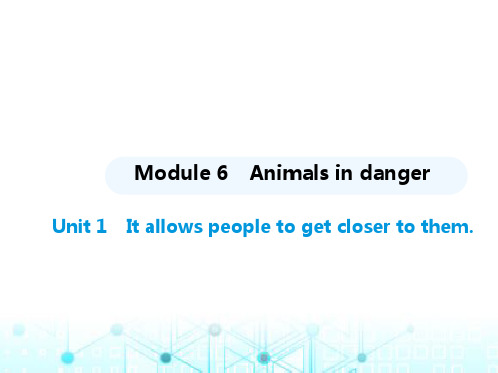
D.careless enough
解析 enough修饰形容词时要后置,先排除选项A和选项C;
根据题干中的“Amy的报告做得很好”可知,她足够“认
真”,注意到了每个细节,careful enough符合题意。故答案为
B。
25.(人与自我·乐于实践)(2024黑龙江哈尔滨南岗区期末)
—How can we know the answer? —We need to do some research to A the answer.
Ⅲ.用所给词的适当形式填空 11.(新素材·神舟十八号)A lot of young teenagers are interested (interest) in our country’s Shenzhou ⅩⅧ mission. 12.It’s very dangerous(danger) for a young child to
the poor children in Guizhou.
9.(国防教育) My brother joined the Chinese army because he wanted to protectour country.
10.(人与社会·畅想未来) I’m going to be an astronaut when I grow up.
swim alone. He or she must go with an adult. 13.(探教材·P42) That means we can give money to help (help)
protect the animals.
14.(思维品质·评价思维)(2023重庆西南大学附中期末)It’s impossible(possible) for them to travel around the world if they don’t have much money. 15.I think it’s necessary to take (take) measures to protect the wild animals living there.
Module 6 Unit 1 I've got some Chinese chopsticks(教
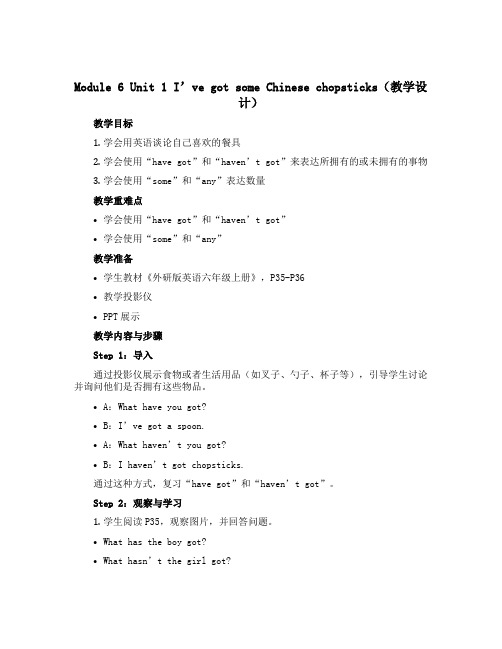
Module 6 Unit 1 I’ve got some Chinese chopsticks(教学设计)教学目标1.学会用英语谈论自己喜欢的餐具2.学会使用“have got”和“haven’t got”来表达所拥有的或未拥有的事物3.学会使用“some”和“any”表达数量教学重难点•学会使用“have got”和“haven’t got”•学会使用“some”和“any”教学准备•学生教材《外研版英语六年级上册》,P35-P36•教学投影仪•PPT展示教学内容与步骤Step 1:导入通过投影仪展示食物或者生活用品(如叉子、勺子、杯子等),引导学生讨论并询问他们是否拥有这些物品。
•A:What have you got?•B:I’ve got a spoon.•A:What haven’t you got?•B:I haven’t got chopsticks.通过这种方式,复习“have got”和“haven’t got”。
Step 2:观察与学习1.学生阅读P35,观察图片,并回答问题。
•What has the boy got?•What hasn’t the girl got?这一步主要是让学生通过观察图片,熟悉“have got”和“haven’t got”的用法。
2.学生观察P35上的对话,回答问题。
•What does the girl want?•What does the boy give her?•What does the girl say in the end?这一步的重点是让学生了解在英语中表达自己想要某物的方式。
3.学生观察P35上的Grammar Focus并学习“some”和“any”的用法。
本部分内容主要是针对“some”和“any”的使用进行详细讲解。
可以结合更多例句来体现这两个词的使用范围。
Step 3:巩固与练习1.学生根据表格(P36)写出自己现有的餐具或装饰品,并使用“have got”和“haven’t got”进行表达。
外研(三起)小学英语六年级上册Module6Unit1课文及翻译

,Listen and read .部分翻译3Listen and say .部分翻译Lookjisten and say .看一看.曰听,说f姆:你有二本关于中国的书吗?姆:你有一本关于美国的书吗?4,Practise.部分翻译....1.1.2.3Module6 UnitlModu e6 UnitllLook» listen and say .部分翻译① Look> listen and say .部分翻译am : Have you got a book about China?hon : No 』haven't .翰:不,我没有。
am : Have you got a book about the US?hon : NoJ haven't .0翰:不,恋殳有。
am : What book have you got?I :你有什么书?hon : I've got a book about the wor d .翰:我有一本关于世界的书。
(2)Listen and read .部分翻译Listen and read ./ / / / /Z / / / / / / / Z / / / / / /听—听,读一^ou've got a letter from Mew York,but it's not from Darning.尔们有一封来自纽约的信,但是它不是大明寄来的.Dear Sam and Amy,亲爰的萨姆和埃米:am Daming's friend and I want to be your friend too.I live in New York,but I am not American.I am from London in the UK.So we are all British!我是大明的朋友,我也想成为你们的朋友。
外研版英语九年级上module6unit1课文及其翻译

Module 6 save our world
UNIT1 It’s wasteful to throw away paper and metal.
扔掉纸张和金属是很浪费的行为。
Betty:Hey, you guys! 嘿,伙计Biblioteka ! Guess what!
猜猜!
We've just got an email from a reader of our New Standard!
“……例如关灯,那样我们就不浪费电了。”他在结束时说:“我有信心如果人人都想着环境和循环使用的话,我们就可以保护空气和海洋,而且可以帮助拯救我们的世界。如果我们不这样做的话,未来就没有希望。”
Tony:Let's ask Zhao Ming to write something.
让我们邀请赵明写点东西。
太好了!上面说什么?他说:“当我正在做我最喜欢的科目的作业时,我看了你们那令人愉快的在线杂志。”
Daming:He read Mr Jackson's article!
他读了杰克逊先生的文章!
Betty:He says, "When are you going to write about environmental education?
“……筹款帮助贫困地区的学生。但是不仅仅是在学校,而且在家里,我们要节约能源和循环使用……?
- 1、下载文档前请自行甄别文档内容的完整性,平台不提供额外的编辑、内容补充、找答案等附加服务。
- 2、"仅部分预览"的文档,不可在线预览部分如存在完整性等问题,可反馈申请退款(可完整预览的文档不适用该条件!)。
- 3、如文档侵犯您的权益,请联系客服反馈,我们会尽快为您处理(人工客服工作时间:9:00-18:30)。
我有一些筷子。
chopsticks
I have got some chopsticks.
knife
他有三把小刀。
knives
He has got three knives.
fork
她有三个叉子。
forks
She has got some forks.
Look at the pictures and do like this.
have got pet dog _____ and my brother I _________a ______a has got pet cat. My pet dog is tall and but my brother’s cat is small and thin. strong____ Sometimes the dog will catch the cat, _____it but can’t catch the cat. Do you know why?
1.Have got句型的一般疑问句: 直接把have/has提前 2.Have got句型的否定句: 直接在have/has后加not hasn’t haven’t
I have got an apple and I can eat it.
I have got chopsticks but I can’t use it well.
He has got a book and he can read it.
She has got a kite but she can’t fly it .
语法小常识
and 和but 的区别。 and 意思是“那么,和” ,表示顺 接。 but意思是“但是”, 表示转折。
Look at the pictures and do like this.
2)I live in New York 3)I’ve got a postcard 4)She’s got an email in French 5)I want to go swimming but and
A. she can’t read it . B. I am not American. C. he often plays with it D. I’ve got a cold. E. it’s from my pen friend.
1.I live in New York. I am not American. (合成一句话)
2.I have got a book about America.
(变一般疑问句)
Finish the short passage with “and, but, have got, has got”. (用我们所学,完成小文章。)
I have got …. We have got ….. Daming has got …... She has got ….. He has got …..
一、Have got/Has got 句型: 表示某人有某物 Have got =Have (1,2,3复) Has got=Has (3单)
语法小常识
and 和but 的区别。 and 意思是“那么,和” ,表示顺 接。 but意思是“但是”, 表示转折。
Have got/Has got 句型: 表示某人有某物 Have got =Have (1,2,3复) Has got=Has (3单)
1)Sam has got a pet dog
What’s Laura’s question?
Laura has got Have you got some a book about chopsticks, America? but they are difficult.
短语积累
• • • • • • a postcard from New York 来自纽约的明信片 live in 住在 want to visit China 想参观中国 in the park 在公园 a book about America 一本关于美国的书 给……写信 write to
发fill in the blanks.
(细读课文,完成表格。记得用课文中的完整句子。)
What has What has Daming got? Laura got? Daming has got a Chinese kite and we can fly it in the park.
A: I have got ……and I can…... I have got ……..but I can’t ….. She has got… and she can…. He has got ……but he can’t….
你知道明信片的格式吗?
Do you know?
接收人的姓名
接受人的地址
